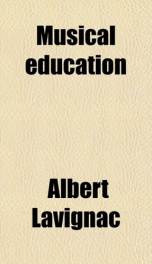musical education

Purchase of this book includes free trial access to www.million-books.com where you can read more than a million books for free. This is an OCR edition with typos. Excerpt from book: III. Natural Aptitudes, Hereditary Talent And Early Influences This very naturally leads me to point out the too frequent fault that, from the point of view of aptitude, consists in regarding the child as a sort of continuation of ourselves, and determining his career in accordance with that which we should like to have embraced and which we regret that we did not follow. Most certainly there exist cases of heredity in artistic disposition as in everything else: from the Sixteenth to the Eighteenth Century we have been enabled to see the tribe of the Bachs peopling Thuringia, Saxony and Franconia with a host of artists of the first order, who, in order to preserve a kind of patriarchal bond among themselves, assembled once a year, sometimes at Erfurt, sometimes at Eisenach or Arnstadt, to the number of a hundred or a hundred and fifty. We may cite from antiquity the Hortcnsius, Curio, and Lysius families, in which the art of oratory was transmitted, even among the women; /Eschvlus, in whose family eight tragic poets are counted; and nearer our own time, the Vernets, painters, father and son, for three generations; Mozart, whose father played the violin; and Rossini, whose father played the horn,at fairs! Certainly we might cite others, but it would be just as easy to find contrary examples of children, entirely destitute of all artistic sentiment, whose father and mother were musicians; and, inversely, artists of genius whose parents had never manifested the slightest inclination towards music. Moreover, there are a great number of great artists who pursued their musical studies against the will of their family: Berlioz, whose father, a doctor, wanted him to become a doctor like himself; Wagner, of whom his family had decided to make 'a painter, and who could only give hims...
Info about the book
Author:
Series:
Unknown
ISBN:
1273204247
Rating:
4.5/5 (3)Your rating:
0/5
Languge:
English
Users who have this book
Users who want this book
What readers are saying
What do you think? Write your own comment on this book!
write a commentif you like musical education try:
Do you want to exchange books? It’s EASY!
Get registered and find other users who want to give their favourite books to good hands!


